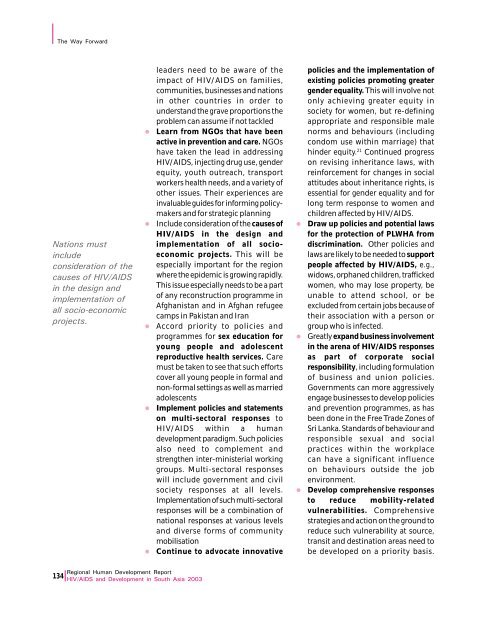Download Report - UNDP Asia-Pacific Regional Centre - United ...
Download Report - UNDP Asia-Pacific Regional Centre - United ...
Download Report - UNDP Asia-Pacific Regional Centre - United ...
You also want an ePaper? Increase the reach of your titles
YUMPU automatically turns print PDFs into web optimized ePapers that Google loves.
The Way orwardNations mustincludeconsideration of thecauses of HIV/AIDSin the design andimplementation ofall socio-economicprojects.lllllleaders need to be aware of theimpact of HIV/AIDS on families,communities, businesses and nationsin other countries in order tounderstand the grave proportions theproblem can assume if not tackledLearn from NGOs that have beenactive in prevention and care. NGOshave taken the lead in addressingHIV/AIDS, injecting drug use, genderequity, youth outreach, transportworkers health needs, and a variety ofother issues. Their experiences areinvaluable guides for informing policymakersand for strategic planningInclude consideration of the causes ofHIV/AIDS in the design andimplementation of all socioeconomicprojects. This will beespecially important for the regionwhere the epidemic is growing rapidly.This issue especially needs to be a partof any reconstruction programme inAfghanistan and in Afghan refugeecamps in Pakistan and IranAccord priority to policies andprogrammes for sex education foryoung people and adolescentreproductive health services. Caremust be taken to see that such effortscover all young people in formal andnon-formal settings as well as marriedadolescentsImplement policies and statementson multi-sectoral responses toHIV/AIDS within a humandevelopment paradigm. Such policiesalso need to complement andstrengthen inter-ministerial workinggroups. Multi-sectoral responseswill include government and civilsociety responses at all levels.Implementation of such multi-sectoralresponses will be a combination ofnational responses at various levelsand diverse forms of communitymobilisationContinue to advocate innovativelllpolicies and the implementation ofexisting policies promoting greatergender equality. This will involve notonly achieving greater equity insociety for women, but re-definingappropriate and responsible malenorms and behaviours (includingcondom use within marriage) thathinder equity. 21 Continued progresson revising inheritance laws, withreinforcement for changes in socialattitudes about inheritance rights, isessential for gender equality and forlong term response to women andchildren affected by HIV/AIDS.Draw up policies and potential lawsfor the protection of PLWHA fromdiscrimination. Other policies andlaws are likely to be needed to supportpeople affected by HIV/AIDS, e.g.,widows, orphaned children, traffickedwomen, who may lose property, beunable to attend school, or beexcluded from certain jobs because oftheir association with a person orgroup who is infected.Greatly expand business involvementin the arena of HIV/AIDS responsesas part of corporate socialresponsibility, including formulationof business and union policies.Governments can more aggressivelyengage businesses to develop policiesand prevention programmes, as hasbeen done in the Free Trade Zones ofSri Lanka. Standards of behaviour andresponsible sexual and socialpractices within the workplacecan have a significant influenceon behaviours outside the jobenvironment.Develop comprehensive responsesto reduce mobility-relatedvulnerabilities. Comprehensivestrategies and action on the ground toreduce such vulnerability at source,transit and destination areas need tobe developed on a priority basis.<strong>Regional</strong> Human Development <strong>Report</strong>134 HIV/AIDS and Development in South <strong>Asia</strong> 2003
















